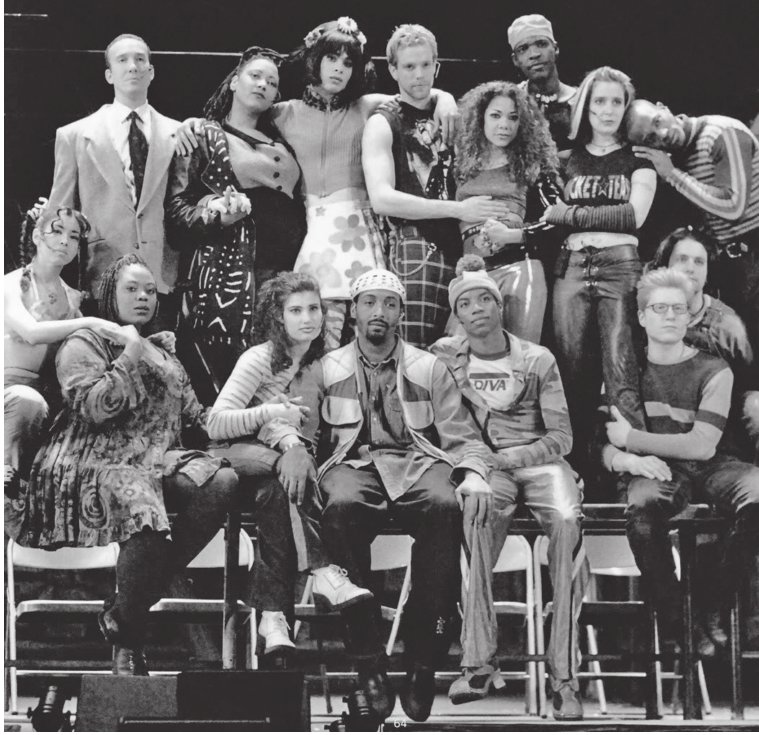
David Merino was in fifth grade when he caught a clip from the 2005 film version of “Rent” on television. Instantly hooked, he soon managed to see the whole film and then picked up the original Broadway cast recording. He felt a deep connection with Angel, the show’s genderqueer HIV-positive street performer.
“It was the first queer character that wasn’t a caricature or the butt of a joke,” he said. “It was a beautiful queer individual who spread love, nothing but love, in her community. It was a beautiful presence that I instantly fell in love with and wanted to be like. “
Roughly a decade later, Merino, 21, was cast as Angel in the 20th anniversary tour of “Rent,” coming to the Wharton Center stage this weekend. The tour is the first professional theater show for the 21-year-old New York University student.
“It’s a dream come true,” he said.

“Rent” was a shocking and compassionate bulletin from the front lines of the HIV/AIDS epidemic when it made its Broadway premiere in April 1996. Since then, it has taken on the dual role of educating audiences about a dark time in history and carrying on work that is still unfinished.
The show follows a group of impoverished artists living in New York’s East Village, many of them living with HIV. Creator Jonathan Larson wrote most of the musical, which is loosely based on Giacomo Puccini’s opera “La Boheme,” between 1988 and 1994, when HIV/ AIDS was a full-blown epidemic, especially in the gay community.
That time still haunts Dr. Peter Gulick, an infectious disease specialist who has been treating HIV patients since the early 1980s, when the mysterious disease was still known as GRID — Gay-Related Immune Deficiency. Gulick opened Lansing’s first HIV clinic in 1984.
“There was no treatment,” Gulick said. “All we could do was treat the opportunistic infections.”
In 1987, doctors began using a drug named AZT to treat HIV patients. The drug, mentioned in “Rent,” ultimately proved ineffective.
“It had no real effect on prognosis,” Gulick said. “Most people still died within two years of the diagnosis.”
Holt native Kelly Stuible-Clark discovered the original cast recording of “Rent” when she was in high school. The musical helped her and many others understand the gravity of the HIV/AIDS epidemic.
“It definitely opened my eyes,” she said.
Last year, Stuible-Clark directed Riverwalk Theatre’s production of “Rent.” She invited Gulick to talk to the cast and crew.
“He gave our cast a history of the disease and a realistic idea of what it meant to be diagnosed with HIV at the time,” she said.
Gulick described an “extreme anxiety” among his early patients, mostly gay men, for whom an HIV diagnosis was essentially a death sentence.
“There was so much fear around HIV and how it was transmitted,” he said. “The families of these patients would totally abandon them.”
In “Rent,” that anxiety comes through in the scenes at Life Support, a support group for people with HIV.
“Will I lose my dignity? Will someone care?” the ensemble sings. “Will I wake tomorrow from this nightmare?” To better understand that sense of desperation, Merino watched several documentaries on the HIV/AIDS epidemic. He found 2012’s “How to Survive a Plague” particularly helpful.
“You see a lot of individuals going through the disease, seeing what the disease brings to your appearance, your disposition, your physique, your health,” he said. “Watching it deteriorate, it’s so — I can’t even describe it. I’m speechless.”
On the medical front, modern HIV treatments have progressed to the point that with proper treatment, most HIV patients can live to an average lifespan. Gulick finds he is spending more of his time treating complicating factors like lung disease and heart disease that come with old age.
“I’ve even talked to some nurses who think HIV is cured, because they don’t see the patients in the hospital anymore,” Gulick said.
And despite the medical advances, public knowledge around HIV still lags. A 2012 poll by the Kaiser Family Foundation found that 27 percent of respondents incorrectly believed that you can get HIV from sharing a drinking glass with an HIV-infected person, and 17 percent believed you can get it from touching a toilet seat used by an HIV-infected person. Those numbers were virtually the same in 1987, when those misconceptions were believed by 26 and 19 percent of respondents, respectively.

“It’s gotten better, but there’s still a lot of ignorance,” Gulick said. “A lot of education still needs to be done.”
Shows like “Rent,” Merino said, have the power to change public opinion by putting stories of people struggling with HIV in front of audiences all over the country.
“‘Rent’ is screaming in your face what kind of show it is, what kind of lifestyle it’s advertising, which is a very accepting and progressive existence,” Merino said. “A lot of musicals don’t preach that — a lot of musicals don’t take the time to preach. But ‘Rent’ is a great model of a musical that says something and does something while still being a spectacle and being entertaining.”
Merino said that even on its 20th anniversary tour, “Rent” still seems to offend some viewers with its embrace of gay, trans and bisexual lifestyles.
“It’s kind of sad to look down during ‘Seasons of Love,’ the Act II opener, and there are seats empty,” he said. “It’s not discouraging, and it’s not horrible, but it’s something we notice.”
The fact that people still walk out, Merino said, actually reinforces the need for shows like “Rent.”
“To present stories like this to people who don’t normally see them, I think that’s very important,” Merino said. “It’s made to show a different perspective on life. ‘Rent’ speaks to everyone and deserves to be heard by everyone.”
“Rent”
20th Anniversary Tour 8 p.m. Friday, March 17; 2 p.m. and 8 p.m. Saturday; 1 p.m. and 6:30 p.m. Sunday Tickets start at $41/$28 students Wharton Center750 E. Shaw Lane, East Lansing (517) 432-2000, whartoncenter.com
Support City Pulse - Donate Today!
Comments
No comments on this item Please log in to comment by clicking here